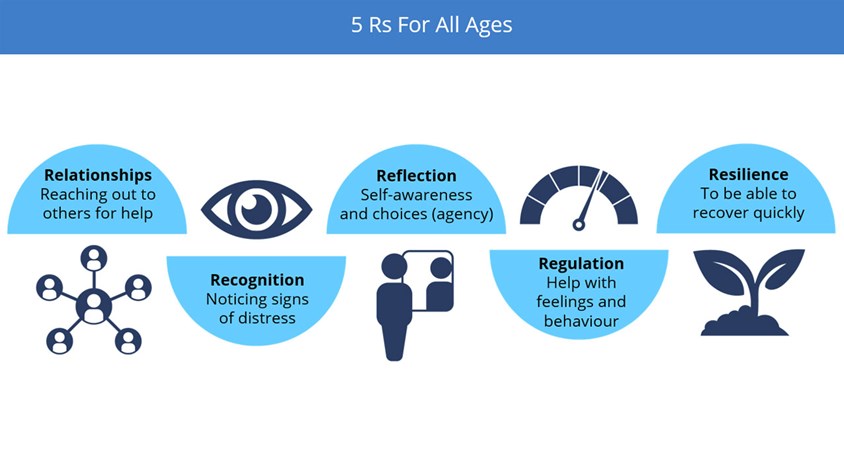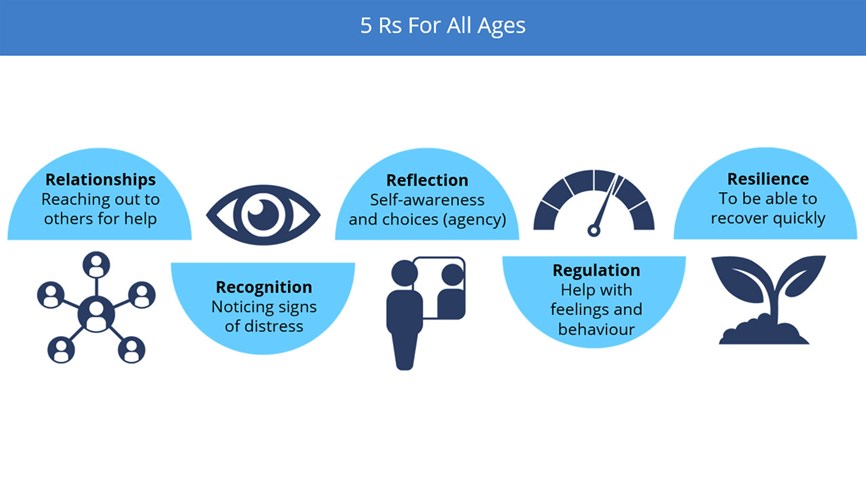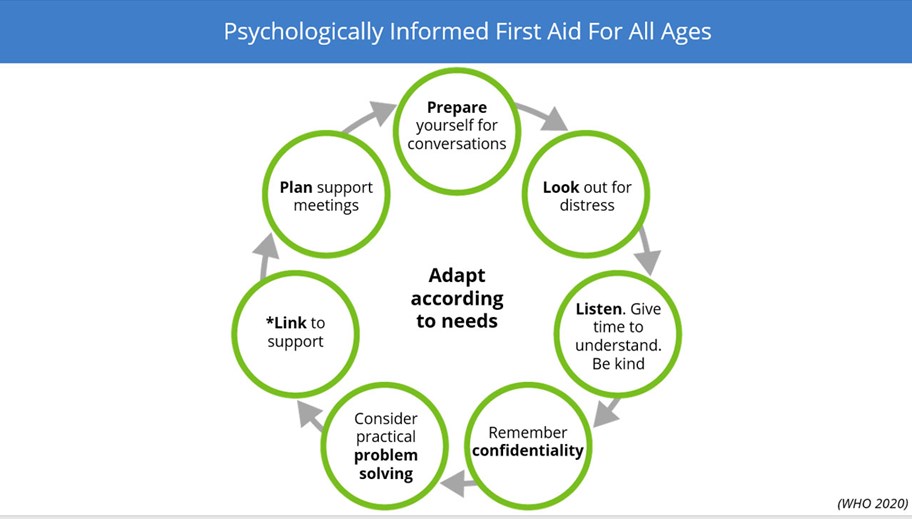Loss and Bereavement – Bite size advice for Supporting Children and Young People
Sadly, loss and bereavement are normal but can be very difficult events in life. They have become more complicated during the coronavirus pandemic.
Losses without death
Children and young people can suffer loss without death due to the interference of the coronavirus pandemic on their normal life, impacting on:
-
- Family: relationships, safety and financial security
- Seeing friends
- Their possessions
- School: trust in adults and what they say
- Sports and activities
- Loss of hoped-for futures and opportunities
Bereavement
Bereavement has been made more complex and difficult as some children and young people have been unable to say goodbye to loved ones and grieve in the normal way. People are often grieving without the support that they would normally have from extended family and friends. If you are unsure whether a child or family have had a bereavement or not, it is wise to ask an adult in the family.
For both bereavement and other losses
- Loss and grief are individual. Everyone will react differently and at different speeds. There is no right or wrong way to react
- Provide opportunities to talk over time
- Support them to remember and make sense of what has happened
- Put the child or young person’s feelings above your own. If they won't engage with you, don’t take it personally. Make sure they are safe and then give them some space. Be available for whenever they do want to do so
- Use language they will understand and check out what they have understood
- To contain a child’s emotional needs you need to be able to manage your own emotions. This includes any emotional responses evoked in you
- It is important to create a ‘reflective space’ in your mind to do this. You may need to seek advice from peers or supervisors to help yourself achieve this
More for bereavement and other losses
- With loss or bereavement, children and young people can feel very lonely and isolated from their peers
- Help them to keep in touch with their peers if at all possible
- Encourage physical and creative activities – they can provide an outlet for feelings; they help emotional regulation and support a sense of agency and self-esteem
- Understand the usual range of moods, thoughts and feelings that can come with grief
- Be prepared to give explanation and reassurance about this to the child or young person
- If the young person is at serious risk of self-harm or debilitating anxiety or depression, ensure they get appropriate support
- Be aware of the increased risk of complex grief, of possible anxiety and depression, including suicidal thoughts
Bereavement is complicated by the pandemic
Bereavement has become complicated by the coronavirus pandemic.
- Children may have been impacted by the decisions of adults about the care of sick relatives. For example:
- The stress of caring for relatives who are not, or who choose not to be admitted to a hospice/hospital at the end of their life. The whole family may have to shield etc.
- Someone may have died at home, especially if this was unexpected
- Children, young people and parents may have lost loved ones without the opportunity of spending time with them before and as they died
- The pain of not being able to visit someone dying in hospital/hospice
- Fears about what happened to their relative when they were dying
- Family beliefs, traditions and religious rituals are likely to be very important for the whole family
- This includes children and can affect their grieving
- Families may not be able to follow their expected rituals and traditions. This can add to the burden
- Not being able to say goodbye / view the body / attend a funeral and other cultural rituals all affect children as well as adults in families
The reality of death
- A child or young person may feel guilt, anger or that a death is very unfair
- They often feel that they somehow contributed to or caused the person to die. It can be distressing for the child and those listening to the child’s concerns
- They may feel anger that someone else could have acted differently to prevent the death
- Encourage parents to include children in the funeral, other rituals or a memorial service
- Remember, grief is a difficult journey; it takes time. It does not follow simple rules and it is individual
- Check with the family how they have explained the death to the child. You will want your narrative to be consistent with theirs. Parents sometimes use half-truths to protect their children. You need to negotiate an explanation that the child will accept with the parents.
- If a child wants to talk about death and dying, be honest and don’t avoid the topic
- When you talk, use clear and simple age-appropriate language that they can easily understand
- Remember, parents and carers are probably feeling vulnerable too
- Show compassion
- Younger children may not realise the permanence of death. This is not a reason to avoid talking about it
Active listening is essential to understand other people
- Listen very carefully
- Summarise
- Reflect back what you think you heard
- Check you have it right
- Defer judgement
- Expand with open questions e.g. “Is there anything else you want to talk about?”
- Respond appropriately – beware of leaping into premature action, be open to working out a collaborative plan
More suggestions
- Find ways of remembering the good things
- Help the child to find a place in mind for the person who has died; that’s part of the bereavement process
- Help the child to understand that it takes time for life to grow around grief
- With time, help them notice that they may have grown in some way as a result of the painful experience
- If the relationship had positive elements, that can be the best memorial. Help the child to notice this
- Remember important dates with the child or young person, such as birthdays and anniversaries
- Remember, parents and carers are probably feeling vulnerable too
Remember
- Many people cope well and recover with ordinary community and family supports
- In schools and colleges, peer networks and mentoring are part of the ‘social scaffold’ for pupils, staff and parents/carers alike. Think about whether there are parallel networks in other organisations
Memory making is important for the bereaved
- Teenagers have an adult concept of death - they may challenge other people’s beliefs and explanations
- Children aged 5-7 years gradually develop the understanding that death is permanent
- Do not press a child or young person to say any more than they want
- Think about what you can do for all children and young people. Be attuned to those who are vulnerable
- Encourage children to play out their feelings and create opportunities and spaces for this. Sometimes, young people need to do this through art, writing, music, exercise etc; sometimes they want to talk to a person of their choosing
- Remember and use the 5 R’s:

Some people (a smaller number) will need additional professional support
- Identify and monitor children who may be at higher risk from losses during the coronavirus and not recovering well
- Notice those who may need additional support; know when to consult someone else about any concerns you have, and when to refer. Remember to use community resources if they are available to you, such as peer networks and mentoring, groups and clubs
- If your school/college experiences death of a pupil or staff member, seek specialist help
Children’s behaviours and moods may change. They may
- Become excessively worried or anxious
- Be more likely to push away those who could be supportive
- Be withdrawn or show difficult behaviour. Be prepared for both
- Be irritable, have tantrums or have difficulty concentrating
- Become inappropriately boisterous; this is unlikely to reflect enjoyment, rather, distress
- Be depressed with a low mood, be withdrawn and have problems concentrating
- Show regression in behaviour, like a younger child (thumb-sucking, bedwetting, baby talk, etc.)
- Have difficulty sleeping
- React with stomach aches or headaches – help them with words to express their thoughts and feelings
- Struggle to “fit in” or know how to tell their friends what has happened
Persistence of changes over several weeks, or an intensification of difficulties should be alerting signs for signposting or seeking further more specialised advice and resources

Sometimes, relationships are very unhappy, e.g. in abusive relationships. Here, bereavement is more complex
- Understanding oneself in relation to how another person behaves is not simple. It often requires further support/counselling

Remember children with other vulnerabilities, such as (not exhaustive)
- Previous traumatic loss
- Young carers
- BAME children and young people
- Looked after children
- Ongoing family psychiatric disorder
- Physical vulnerabilities
- Hidden disabilities (e.g. autism)
For such children, a bereavement is likely to compound difficulties
Some warning signs that a child or young person may need extra help
- Several weeks of sadness or depression, with a reduced interest in daily activities. This may very during the day; there may even be moments of pleasure and joy but the main mood is sadness
- Withdraws from friends
- Cannot sleep, loses their appetite, or develops a prolonged fear of being alone
- A sharp drop in school/college performance
- Refuses to attend school/college
- Acts like a much younger child for a long time
- Neglects themselves
- Refuses to believe that the family member has died
- Starts to imitate the dead person much of the time
- Talks repeatedly about wanting to join the dead person. They may need urgent assessment in CAMHS
- Difficulties become worse or new troubles persist after several weeks
Further Resources
Winston's Wish - free online bereavement training accessible without charge after registration
Cruse- variety of leaflets which may be helpful
Cruse - information for if a staff member dies
Bereavement UK resources for Schools and Colleges
Anna Freud Centre - Bereavement and Loss
MindEd
E-learning for professionals including Teachers
To find Bereavement Support near you
Wellbeing for Education Return webinars:
Webinar 1: https://www.minded.org.uk/Component/Details/662131 Describes whole School/College approaches, wellbeing and support of resilience building in the context of Covid-19
Webinar 2 https://www.minded.org.uk/Component/Details/662134 focuses on those who may need additional support with one or more of; Loss, Bereavement, Grief, Anxiety, Low Mood, Stress, Trauma in the context of Covid-19
For Parents and Carers
MindEd for Families - Death and Loss including pets
MindEd for Families - Talking to much Child or Teenager
Broader Mental Health Sources
MindEd for Families
Broader mental health resources for parents
Royal College of Psychiatrists - information about various mental health disorders with information for patients, carers, family and friends relating to mental health problems and disorders - with downloadable free leaflets
Broader mental health resources for parents
Guidance for parents and carers on supporting children and young people’s mental health and wellbeing during the coronavirus (COVID-19) pandemic
Broader mental health resources for parents
Previous
Disclaimer
This document provides general information and discussions about health and related subjects. The information and other content provided in this document, or in any linked materials, are not intended and should not be construed as medical advice, nor is the information a substitute for professional medical expertise or treatment.
If you or any other person has a medical concern, you should consult with your healthcare provider or seek other professional medical treatment. Never disregard professional medical advice or delay in seeking it because of something that you have read in this document or in any linked materials. If you think you may have an emergency, call an appropriate source of help and support such as your doctor or emergency services immediately.
MindEd is created by a group of organisations and is funded by NHS England, the Department of Health and Social Care and the Department for Education.
© 2023 NHS England, MindEd Programme



